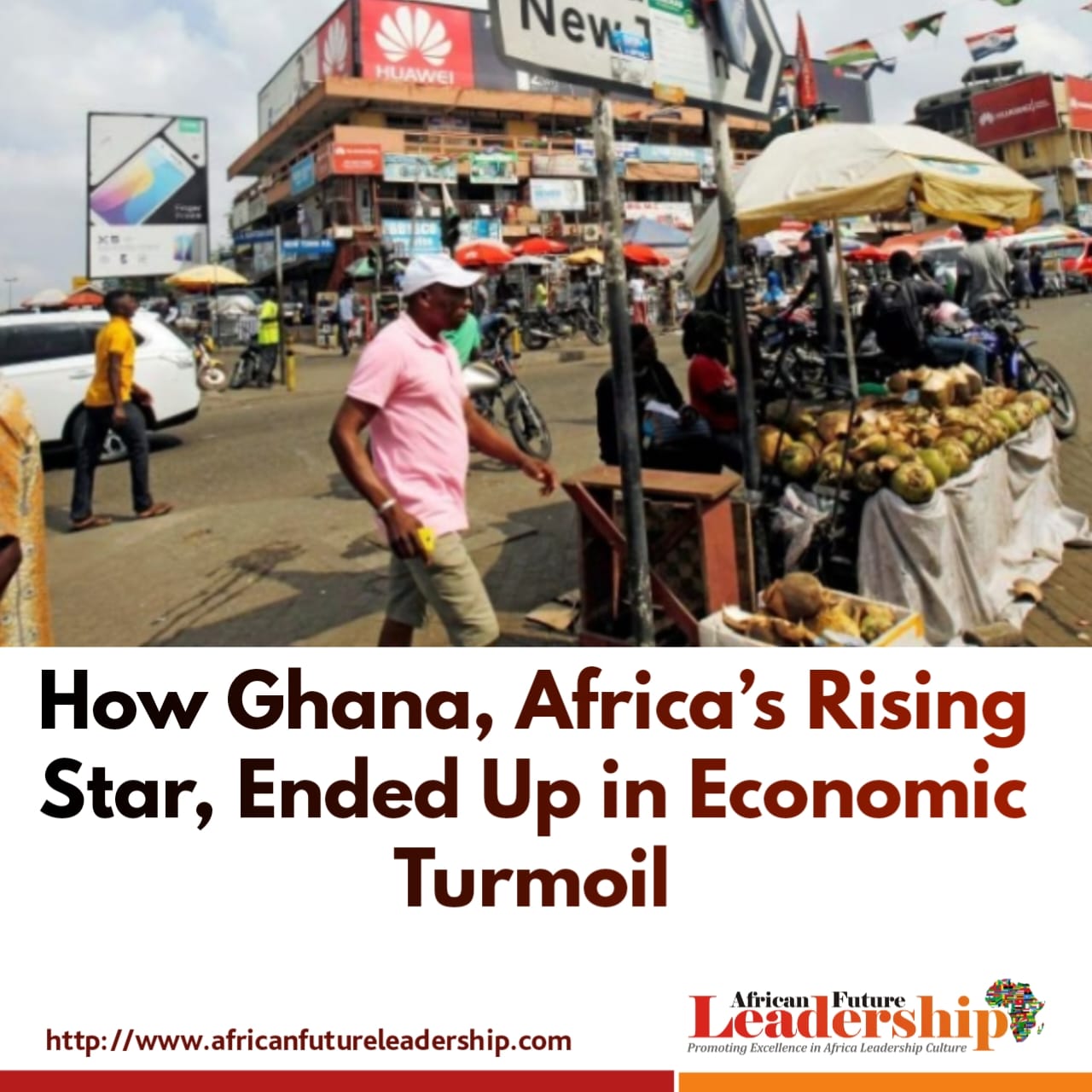Contemporarilly, Ghana is a major cocoa and gold exporter, so why is the West African nation battling its worst economic crisis in decades?
On a major Accra street, Doris Oduro sits at her small, almost-empty store in Odorkor, a suburb of Ghana’s capital, Accra. The single mother of two is utterly frustrated. After 15 years in business, she is now considering closing because she cannot restock her shop due to rising, high cost of living.
Wondering at her challenge Oduro, 38, told reporters, “I am running at a big loss.” She sells imported items, including juices, biscuits, soft drinks, toiletries and sweets, but Ghana’s economic crisis is taking a huge toll on her business.
She explained that, “Prices of goods keep soaring, and it is affecting my principal capital. I want to close my store and find something else to do. Things are tough for me because I can’t sustain the business and I have a family to keep.”
Worrisomely, Ghana a country once described as Africa’s shining star by the World Bank, and was the world’s fastest-growing economy in 2019 after it doubled its economic growth is in economic turmoil. Today, it is no longer the economic poster boy of West Africa. Despite being a major cocoa and gold exporter, it is currently battling its worst financial crisis in decades with inflation soaring at a record 50.3 percent, the highest in 21 years.
READ MORE: US, Europe, China in race for Africa, scramble for continent begins
Indeed, Ghana’s economic successes were in the limelight when the new government of President Nana Akufo-Addo took power in January 2017 and brought down inflation significantly. Under the previous government in 2016, it was 15.4 percent, and it fell to 7.9 percent by the end of 2019 and remained in single digits until the pandemic hit in March 2020.
Again, Ghana’s budget deficit, which was about 6.5 percent of the nation’s gross domestic product before Akufo-Addo’s government came to power, was brought down to under 5 percent of GDP by the end of 2019.
However, “The growth that we experienced around 2017 to 2019 was actually coming from the oil sector,” Daniel Anim Amarteye, an economist with the Accra-based Policy Initiative for Economic Development, told reporters.
“We were so excited that the economy was growing, but we couldn’t devise strategies to ensure that the growth reflects in the other sectors of the economy,” he said. “For instance, we neglected the agriculture sector, and we couldn’t do any meaningful value-added investment in that sector because the government became complacent.”
Currently, Ghana’s cedi currency lost more than 50 percent of its value in 2022.
From a report the United Nations’ Food and Agriculture Organization, agriculture represents 21 percent of Ghana’s GDP and accounts for more than 40 percent of its export earnings. At the same time, it provides more than 90 percent of the food the country needs.
But “Over the years, the government failed to invest in increasing output in the agricultural sector that will eventually lead to economic growth and transformation and food security. We are a major cocoa growing country, yet we didn’t pay attention to increasing yields to translate into more foreign exchange earnings to drive economic growth and employment,” Amarteye said.
Again, Ghanaian traders, who contribute significantly to the economy, mostly buy and sell products they import from Western countries and China, including home appliances, consumables, cars and second-hand clothes. Due to the nature of their businesses, there is a persistent strong demand for the US dollar to pay for imports. This led to the continuous depreciation of the local currency, the cedi, which was recently described as the worst-performing on world markets.
At this instance, as inflation surges, rising prices keep the cost of living accelerating for Ghanaians.
Now, “Things are not the same anymore,” said Francis Anim, a vehicle spare parts importer. “I used to spend $5 a day with my wife and child on food alone early this year. Now we spend close to $10 (for the same amount of food). Why? he pondered”
And he enthused that, “We are feeling the heat.” “The import duties are very high at the ports, so we have to pass on that burden to retailers, and eventually the consumer suffers. This has resulted in a high cost of living in Ghana, and the economy is not helping us either.”
Hence seeing that Ghana had become, a nation in dire straits, the president conceded in a recent address to the nation that the West African country is in crisis. He blamed the situation on external shocks: the pandemic and Russia-Ukraine war.
Analysts are, however, have said that the government took certain political and economic decisions that would have eventually exposed the weaknesses in the system even without those external factors.
They say that for instance, to fulfil one of Akufo-Addo’s most expensive campaign pledges, his government launched a free education programme in public high schools, nine months after he took office. It also provided free meals to students at primary and secondary levels.
Additionally, in 2017, the governing New Patriotic Party scrapped what it called 15 “nuisance taxes”. These included the 17.5 percent value added tax on financial services, real estate and selected imported medicines. They also reduced import duties on car spare parts, abolished the 1 percent special import levy and the 17.5 percent VAT on domestic airline tickets.
Quite Consequentially, “This brought a massive reduction in government revenue,” Williams Kwasi Peprah, a Ghanaian associate professor of finance at Andrews University in Michigan, told reporters. “To make up for the revenue shortfall, the government adopted borrowing. This increased Ghana’s bond market activities domestically and externally and, as a result, a high debt-to-GDP exposure, leading to the current debt unsustainability levels.”
READ MORE: The future of global music is African
Then from August 2017 to December 2018, Akufo-Addo’s government spent more than $2.1bn on what it called the “banking sector clean-up”.
Also, the Central Bank said some banks were insolvent and were operating on life support, putting the interests of depositors at risk. The clean-up saw a reduction in the number of banks from 33 to 23 while more than 340 other financial institutions, such as savings and loans companies, had their licences revoked.
Thus, the government aimed to restore confidence and reposition the banking sector to support economic growth but to very little or no effect .
Meanwhile, Ghana’s President, Nana Akufo-Addo became Ghana’s president in 2017 and was re-elected in 2020.
Under him, “The financial sector clean-up also cost the country more than anticipated in attaining a robust financial sector before 2022,” Peprah said.
Perpah, an Associate Prof. of Finance said the discovery of two more oilfields in 2019 led to the anticipation of more revenues. Hence, the government responded by issuing more domestic and external bonds, increasing its debt and raising spending on interest payments, social programmes and employment causing riding inflationary trends that have worsened today.




